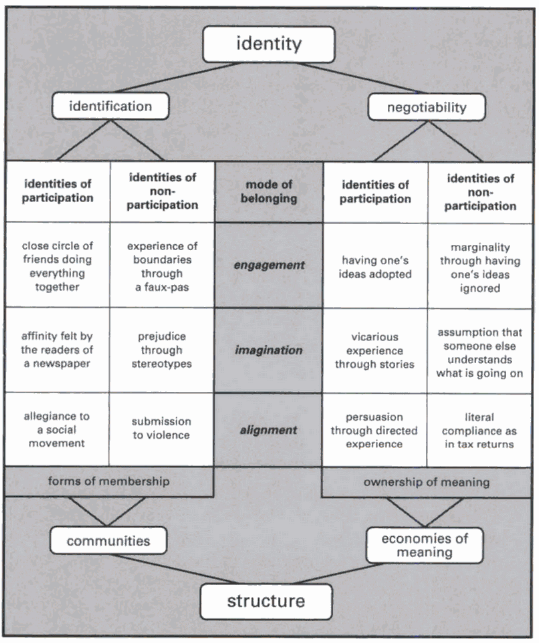Identification and negotiability
These notes are part of a series for the book.
Outline
- Identification
- Identification through engagement
- Identification through imagination
- Identification through alignment
- Negotiability
- Economies of meaning
- Ownership of meaning
- Negotiability through engagement
- Negotiability through imagination
- Negotiability through alignment
- The dual nature of identity
- The dual nature of power
- The dual nature of belonging
- The dual work of identity
- Social ecologies of identity
Notes
‘Learning is a matter of social energy and power’ (from the 13 principles defining learning, Wenger, 1998, p. 227).
There are two processes to forming identity: Identification and negotiability. Both are needed, and each reinforces the other. You can have participation and non-participation in each of the identity-forming processes.
Social ecology of identity (Wenger, 1998, p. 190).
Identification
Identification: Part of the process of forming identity; creating bonds and becoming invested in those bonds, resulting in making the modes of belonging (engagement, imagination, and alignment) part of our identity.
| Characteristic | Engagement | Imagination | Alignment |
|---|---|---|---|
| Examples within identification as part of the process of forming identity | Participation: 'Close circle of friends doing everything together' Non-participation: 'Experience of boundaries through a faux-pas' | Participation: 'Affinity felt by the readers of a newspaper' Non-participation: 'Prejudice through stereotypes' | Participation: 'Allegiance to a social movement' Non-participation: 'Submission to violence' |
| Examples within negotiability as part of the process of forming identity | Participation: 'Having one's ideas adopted' Non-participation: 'Marginality through having one's ideas ignored' | Participation: 'Vicarious experience through stories' Non-participation: 'Assumptions that someone else understands what is going on' | Participation: 'Persuasion through directed experience' Non-participation: 'Literal compliance as in tax returns' |
Identification is a reification, because you are identifying as a category or role. It is also a participation in the process of identifying with the category or role. Identification is something we do to ourselves and to others. We identify with a community and others recognize us as members.
| Characteristic | Participation | Reification |
|---|---|---|
| They intersect with identification | Identification, which is part of the process of forming identity, is a participation in the process of identifying with a category or role. | Identification, which is part of the process of forming identity, is a participation in the process of identifying with a category or role. |
Identification work:
- Inclusion and exclusion, defining boundaries
- Allegiance and affinity
- Trust and acceptance
- Shared histories
Negotiability
Negotiability: Part of the process of forming identity; ability to shape meanings within a social configuration. Social configurations are groups of people; this can be communities of practice or other groups such as departments, families, nations, people sharing a space or resource such as commuters, etc.
While identification is shaping meaning within communities, negotiability is our ability to shape meaning within an economy of meaning in a social configuration.
- Economy of meaning: Communities may have different understandings and meanings. These meanings form an economy: some have higher status than others, and the relative values of the differing meanings can reflect legitimacy and power. Note: A COP is a community and an economy of meaning.
- Ownership of meaning: The degree to which we can make use of the meanings we negotiate.
For example, old-timers and newcomers in a COP may have different abilities to determine the value of an activity or artifact. The difference may be based on their experience, knowledge, and skill level, or may be based on perceived legitimacy within the COP.
There are tensions between identification and negotiability, both inside a social configuration and from outside it usually relating to issues of power and belonging. So, if identification and negotiation are processes that shape identity, then looking at how identity is shaped requires understanding power and belonging.
Negotiability work:
- Listening to other perspectives
- Making policies transparent
- Inviting contributions
- Defining rights and distributing authority
- Challenging boundaries, confronting, voting
